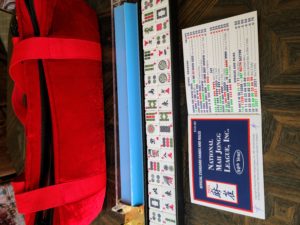
Mahjong players want you to know that the tile game isn’t just for bubbes.
“Over the last five years, it’s just unbelievably grown,” said Gail Stein, who teaches a beginner’s mahjong class at Old York Road Temple-Beth Am in Abington.
Stein began teaching the class over a decade and a half ago, with membership hovering at around 35 to 40 per week. Although COVID-19 forced in-person attendance to drop, the Sisterhood-sponsored group still meets weekly, maxing out the capacity of their meeting space. Stein said five people have spots on the waiting list.
Although the group skews older, and still consists mostly of older women reaching retirement age or becoming empty nesters, the class has seen a few new faces.
“We’re starting to get the next generation,” Stein said.
The youngest player to join the class was 13. A man in his 20s or 30s started attending the weekly meetup as well.
“They know if they walk in our door that they are accepted and that we will find a place for them to play,” Stein said.
Mahjong is a strategy game, with Japanese, Chinese and American variations. Players aim to create a certain “hand” of tiles that contain various suits.
Beyond being an entertaining game to play, mahjong is mostly played for social purposes, Stein said. It’s been this way since she was young, when she learned at 7 years old how to play mahjong from her mother. Stein played the game with a group of 16 friends in high school.
“It’s just fun,” she said. “It gives me so much pleasure to watch these girls have something to do that’s fun because we all work so hard in our lives, and you don’t have time for fun.”
Although Temple-Beth Am Sisterhood’s mahjong group leans toward the typical demographic, their core interest in playing the game for its social benefits is what’s piqued the interest of more young players.
Just before the COVID-19 pandemic began, Tribe 12, a Philadelphia-based organization connecting 20- and 30-something-year-old Jews, hosted a Mahjong 101 night for women and non-binary Jews to learn the game.
The programming stopped due to the pandemic. When Tribe 12 asked members what programs they wanted to see in the coming year, mahjong made several appearances on people’s lists of requests.
“We had a few people say that they’re really interested in mahjong — either people who were in the group before wanting to start up again or people who have never played it, wanting to be part of a game,” said Polly Edelstein, Tribe 12’s program manager.
“It seems to be a very big thing in pandemic life to have people being nostalgic for things, even goofy things that they did in middle school,” Edelstein said.
For young people with grandmothers who grew up playing the game, mahjong is not only a throwback game, but also a cultural touchstone and connector to past generations.
“The pandemic has really highlighted that people are not interested as much in the superficial anymore,”
Edelstein said.
The younger generation’s interest in mahjong has been present for a while now, but it has been latent, said Sarah Allen, co-leader of the Philadelphia Riichi Mahjong Club, which holds weekly mahjong games at the Thirsty Dice game cafe in Philadelphia.
Allen, 25, first found out about mahjong when watching an anime in high school. She started playing the game online, but she soon forgot about it until she encountered a group of people playing the game at the Thirsty Dice in late 2019. She’s been playing regularly with the group since July.
Mahjong is one of many tabletop games that has witnessed a growing audience overall.
“Recently there’s been this renaissance or resurgence of tabletop games,” Allen said.
Allen added that she’s drawn to the physicality of the game. Although she first picked up mahjong online and enjoys playing virtually, the online game isn’t the same as playing with a group in-person.
“There’s something more fun about playing it in-person — actually sitting at the table, moving the tiles around with your hands,” Allen said.
[email protected]; 215-832-0741






